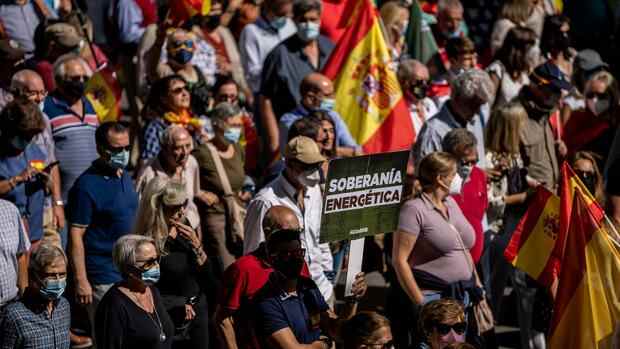Spain responded to price increases in June by lowering electricity generation tax and VAT.
(Photo: AP)
Brussels, Rome, Madrid, Paris Half a year before the presidential election, the government in Paris is worried about a scenario: The sharp rise in electricity and gas prices could drive dissatisfied citizens onto the streets. One of the most turbulent phases of President Emmanuel Macron’s term in office was the yellow vest movement in the winter of 2019, which grew into riots, when it was about higher taxes on gasoline and diesel.
Macron’s government is now intervening in the already heavily regulated energy market. The promise: The renewed increase in the gas price by 12.6 percent is the last unreasonable demand this winter. Prices would be frozen until next April.
The electricity price is only allowed to rise by a maximum of four percent into the coming year – instead of the expected increase of more than twelve percent. Almost six million households with low incomes also receive an “energy check” for 100 euros.
Of the approximately ten million households that heat with gas, around half fall below the state-regulated gas price. The other households have long-term contracts with a fixed price.
Top jobs of the day
Find the best jobs now and
be notified by email.
The energy supplier Engie, in which the state is a major shareholder, will initially pay the costs. Engie was therefore cautious: Take note of the decision and talk to the regulatory authorities. The legal situation also provides that suppliers are compensated in the event of a price cap.
Spain collects profits from producers – Italy relieves families
Spain had already responded to the price increases in June by lowering electricity generation tax and VAT. The Spaniards feel rising energy prices quickly because many of them have variable electricity tariffs. In mid-September the government stepped up, including lowering the electricity tax from 5.1 to 0.5 percent by the end of the year.
In addition, Madrid collects profits from the energy producers. Nuclear power and hydropower plants are particularly affected: They produce electricity cheaply, but benefit from the currently rising prices.
The outcry from the utilities is great: They argue that 90 percent of contracts with major customers are long-term and that they therefore sell energy well below market prices. Iberdrola and Endesa have already announced price increases to large customers or offered to terminate their contracts.
At the end of September, Italy’s government decided to pay three billion euros in compensation to families and small businesses to cushion rising prices. At the same time, the value added tax for gas was lowered by five percentage points.
Even so, the costs for an average family will rise by around 30 percent for electricity and around 14 percent for gas in the last quarter of the year. Without government intervention, electricity would have become 45 percent more expensive and gas more than 30 percent more expensive.
Euro finance ministers consult
In Luxembourg, the finance ministers of the Eurogroup discussed the issue on Monday for the first time in the format’s existence. France, Spain and others had prepared two proposals for how to react: First, the gas market should be more strictly regulated, especially the trade in storage capacities, said France’s Finance Minister Bruno Le Maire. This is probably intended to curb speculation that could drive up the price.
Second, there should be a direct connection between the costs that are incurred in each country in generating energy and the prices that consumers pay there. France in particular sees itself disadvantaged by the high gas prices: the country produces its electricity primarily with cheap nuclear power and only to a small extent with gas. Nevertheless, the price of electricity is also rising massively in France, as electricity can be traded across Europe.
France’s proposals run counter to other endeavors, according to which the energy markets should be Europeanized right now in order to save money, for example through joint purchases.
More: Europe is in a gas price crisis – these are the consequences for the supply in Germany

